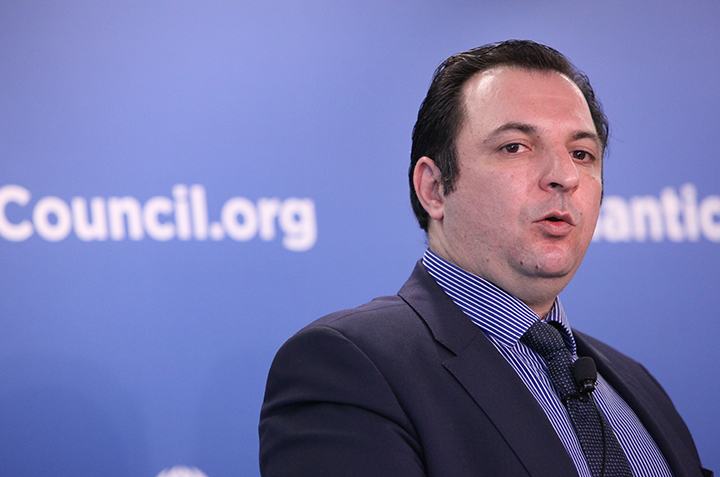 The solution to the situation in Syria should include a comprehensive process for accountability and transitional justice, according to Mazen Darwish, President of the Syrian Center for Media and Freedom of Expression.
The solution to the situation in Syria should include a comprehensive process for accountability and transitional justice, according to Mazen Darwish, President of the Syrian Center for Media and Freedom of Expression.
Darwish spoke at an event hosted by the Atlantic Council’s Rafik Hariri Center for the Middle East on April 15. Mirette Mabrouk, Acting Director of the Rafik Hariri Center, moderated the discussion.
Darwish noted that at the Geneva talks, everyone is going “around the main topic, without discussing the real solution.” He stressed that there is no easy way to reconciliation. “You cannot press end to this conflict and then expect everything to be right again,” he added.
In order to have real solutions and to prevent the resurgence of another civil war, questions regarding the Kurdish population, political transformation, accountability, and reconciliation need to be addressed, according to Darwish. If these underlying issues remain unaddressed and “do not take into consideration the transitional justice, then we will just have ticking bombs for the future,” he said.
He added that the goal of these discussions should be to develop a comprehensive process for accountability and transitional justice. In order to do so, the international community needs to understand that the peace process is not about seeking revenge against individual actors, but rather to ensure that any political solution is sustainable. He stated that the only way to protect the Syrian minorities is to hold the regime accountable, “not by extermination of the majority or not by awarding those who committed crimes against the humanity and letting them go with those crimes.”
At least 470,000 people have died in Syria since the start of the war in 2011, according to the Syrian Center for Policy Research. The war has also created close to five million refugees.
Darwish stated that unfortunately transitional justice and accountability were not mentioned in any of the documents on which the peace process was built on whether it be in Geneva, Munich or Vienna. He argued that by ignoring these issues and omitting them from the solution, it will create an “explosion in the political process in Syria.”
A huge challenge for Syrian citizens and human rights defenders is that the de facto political authority inside Syria does not “care to answer all those questions or to find a solution…the regime is willing to keep killing inside Syria and destroying the country in order to extend its rule for one day or so,” he said.
Despite these challenges, Darwish stressed the importance of coming up with a resolution.
“Putting the Syrian people in front of only two options, dictatorship or terrorism, is unethical, immoral and unacceptable,” said Darwish.
He highlighted the importance of peace in Syria for Europe and the international community: “This world won’t be alright without peace and development in Syria. Even here in the US, or in Europe, or in any place in the world, we need democracy and peace inside Syria to have democracy and peace in the whole world.”
“It is unacceptable today to be defeated in the face of dictatorship and terrorism,” he added.
According to Darwish, if the Syrian citizens who are looking and willing to fight for freedom and democracy for the future are defeated, then everyone will be defeated. “No one would benefit from that except for terrorism.”
As such, the removal of dictators and the defeat of terrorism are linked.
“If we are really serious to fight ISIS and its ideology, we should guarantee that dictatorship should be defeated first,” he said.
Sarah Wildi is an intern at the Atlantic Council.
Image: “You cannot press end to this conflict and then expect everything to be right again,” Mazen Darwish, President of the Syrian Center for Media and Freedom of Expression, said at the Atlantic Council on April 15. (Atlantic Council/Victoria Langton)
